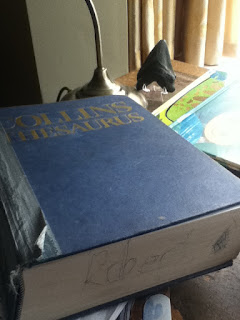When I’m beginning to think about a picture book story, I go straight to a thesaurus and look up the main words that have popped into my mind. It will often send me off in a totally different direction, or give an extra depth to a story.
It’s my version of what Michelle does:
I do use an online thesaurus, but my favourite is still my old Collin’s thesaurus that I bought when I started writing 20 years ago. Yes, it is mine, borrowed by my son when he was studying English for the International Baccalaureate.
I also love The Usbourne Illustrated Thesaurus for children - I bought it for me, not for my sons...
It has fab, often inspirational illustrated entries, like this one on fire. Some, like for ‘fantasy’, ‘pirates’ and ‘space’ have full page illustrations.
In a great article called “ Everything You Need to Know About Writing Successfully – in Ten Minutes,” Stephen King has, as his rule number 5
Never look at a reference book while doing a first draft
Yep! I’d agree, I only use reference books during the thinking, brain storming, note-making process. I don’t stop to check anything while writing a first draft.
But Stephen King also advises
"Better yet, throw your thesaurus into the wastebasket."
Nooo-ooo! I think that would be a terrible
What do you think?






That's a great idea - reading words round your idea before you begin.
ReplyDeleteI've got a 30yr old copy of Longmans Pocket Roget's Thesaurus which sits on my bookshelf and enjoys the being thumbed through from time to time. I can see why Mr King is wary of their (over) use, but if you enjoy words, scrolling down a list can be fun and spark the imagination
ReplyDeleteI love my Thesaurus! When my brain is in a muddle and I know that the perfect word is just out of my brain's reach, Roget saves me.
ReplyDeleteI think I've only used them in the editing phase but I might have a go at the early planning stage... thanks x
ReplyDeleteI too like my old copy of the Usborne Illustrated Thesaurus and the way some subject matter is grouped together - the words seem particularly appropriate for books for lower primary. Or maybe I'm reminded of the illustrated junior dictionary I liked as a child!
ReplyDelete